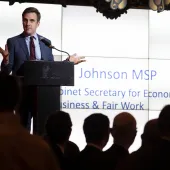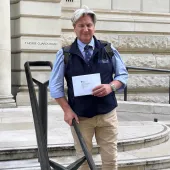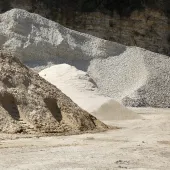New deadline for AGL investigation responses

BAA obtains three-week extension for comments on EU investigation into Aggregates Levy (AGL) exemptions
THE British Aggregates Association (BAA) has obtained a three-week extension for responses to the EU investigation into the Aggregates Levy.
Normally four weeks are allowed from publication of the European Commission decision in the Official Journal, however the BAA explained that it would be challenging for the industry to meet the 27 December deadline due to the extended Christmas holidays.
The new deadline for submissions is now Friday 17 January 2014 (a copy of the EC invitation for responses is attached to this article).
Robert Durward (pictured), director of the BAA, said: ‘We have worked hard for almost 12 years to have the Aggregates Levy properly investigated. We have now been given the best-possible opportunity and it is important that as many companies as possible respond.’
Although it is the companies paying the Levy who have so far been hardest hit, the BAA says this could all change on 1 April 2014, HM Treasury’s scheduled date for withdrawing the exemptions.
Almost all exemptions are now under investigation following the EU General Court decision of March 2012, which struck down Phase 1 approval. However, not only will the exemptions detailed in Business Brief 24/13 be withdrawn from 1 April 2014, but, according the EU law, all illegal state aid must be repaid in full, plus compound interest, from the time that they started.
In the event that exemptions, which include slate, shale and clay used as aggregate, are deemed to have been illegal, this liability will extend back to April 2002.
At the 18 November meeting between HM Treasury and industry representatives, since confirmed in writing, government officials advised that historic payments would not be collected. They went on to claim that if the EU did issue an order to this effect, the UK Government would challenge it in court.
A number of EU member states have indeed challenged such orders, but to date none have been successful.
However, in a related Aggregates Levy enforcement action in the Court of Session in Edinburgh on 4 December, the BAA says counsel for HM Revenue & Customs told a different story. He informed Lord Burns that ‘this statement [non collection] had only been made as the result of a ‘conversation’ with some business people and had no basis in law’.
All registered companies, including large PLCs, have a legal obligation to make provision for contingent liabilities such as this in their published accounts. By the time the EU Phase 2 investigation is completed, the huge amount of liability thus accrued could easily drive otherwise profitable companies out of business.
Mr Durward continued: ‘The aggregates and mineral industries may have a low value in monetary terms, but they are highly nuanced and complex. Many of us actually spend more time trying to market our secondary aggregates than our primary products.
‘Every amendment will bring its own problems and there will be even more needless damage caused to our industry. Imposing a £2 per tonne levy on companies, many of which will already be struggling to survive, will help no one.’
The BAA has again called on the Government to abandon the Levy, arguing that it is unfit for purpose and now has the potential to inflict even more damage than before.
‘The only rational way for the Government to meet its Article 108(3) Treaty obligations, without bankrupting dozens of companies in the process, is to scrap the Levy without further delay,’ said Mr Durward. ‘Our industry needs certainty on its liabilities as well as a level playing field. We can debate repayments for companies that have been paying the Levy at a later date.’









